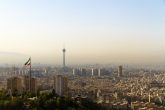February 16, 2017
Is America No Longer the Middle East's Greatest Power?
When Russia launched a dramatic military intervention in Syria in fall 2015, it stunned the world and announced its return to the Middle East. Its move also surprised American policymakers, who had not long before worked with Russia in an effort to rid Syria of its chemical weapons and expressed hope that such cooperation might lead to a broader push for peace. But with its air campaign on behalf of Bashar al-Assad’s regime, Moscow signaled a willingness to intervene more decisively in Middle Eastern politics than at any time since Anwar el-Sadat’s dismissal of Soviet military advisers in 1972 and the Yom Kippur War the following year. For the first time since the end of the Cold War, any attempt to resolve a festering regional conflict must take Russia’s role into account.
This outside intervention is new, but it is not limited to Russia. China has expanded its involvement in the Middle East in recent years. Even India, Japan and Europe, though distracted by crises in their own regions, have recently stepped up their Middle East roles amid perceived American disengagement. Layer on top of this the shattering of regional order in the wake of the Iraq War and the Arab Spring, and the result is the Middle East’s emergence as a commons for great-power competition. As Washington searches for a Middle East strategy and debates what a sustainable U.S. presence should entail, it will increasingly need to navigate the geopolitical game played by outside powers in the world’s least stable region.
This game represents much more than just one additional factor among many that American policymakers must consider as they grapple with the region’s challenges. The United States has not had to contemplate the possibility of other external powers seeking—or even being capable of—hegemony in the region since President Jimmy Carter promulgated his eponymous doctrine in 1980. And while the outside powers remain limited in their aims and means of achieving them, a fundamental shift is occurring today: America’s long position of unchallenged Middle Eastern primacy may be reaching an end.
Read the full article at The National Interest.
More from CNAS
-
Middle East Security / Energy, Economics & Security
Will Iran block the Strait of Hormuz?The world has held a close eye on the Strait of Hormuz lately with Israeli and U.S. strikes on Iran. Nearly a quarter of the world's seaborne oil passes through the narrow wat...
By Rachel Ziemba
-
Indo-Pacific Security / Middle East Security
What Happened to the U.S. ‘Asia First’ Doctrine?U.S. allies in the Indo-Pacific should observe that the Trump administration’s strategic approach to foreign policy is a moving target....
By Adham Sahloul
-
Middle East Security / Energy, Economics & Security
U.S. Enters War In Middle East: Will Iran Block The Strait Of Hormuz?With the U.S. warning Iran against any attack on American assets, Tehran is evaluating blocking the Strait of Hormuz. Will this further escalate the conflict? Will this isolat...
By Daniel Silverberg
-
Middle East Security / Energy, Economics & Security
Trump May Go to War in Iran Without Congress — and That’s Just the New NormalThe Constitution gives Congress the power to declare war but leaves much else unsaid, and potential ambiguity results from the tension between this and the president’s authori...
By Daniel Silverberg




